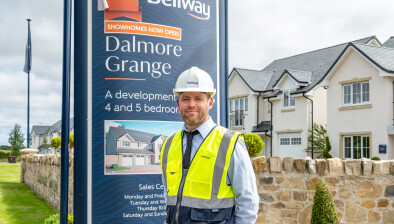Bellway says independence would not change Scottish growth strategy

Scottish independence would not impact Bellway’s growth strategy north of the Border, the housebuilder has said as it revealed healthy growth in turnover and profits.
Speaking as the company released its half-year results, group finance director Keith Adey said there were strong, positive market conditions ahead of the prospect of a second referendum.
“If you do end up with a scenario where Scotland becomes a different country to the UK, to separate that, it’s so embedded I can’t see how it becomes structurally a different country to invest in, in the way it’s different to invest in France,” he said. “The barriers to entry can’t be that great.”
Mr Adey said the 2014 independence referendum didn’t particularly affect the company, but that uncertainty was never welcome.
“Of course it has a degree of uncertainty for people but we’re still investing in Scotland and Scotland is doing very well for us. Demand is strong, we’re buying land and reservations are coming through well. We’ve got a good business so I don’t see how the referendum will change that.”
For the six months to January 31 Bellway made a pre-tax profit of £247.6m on £1,148.5m revenue. The profit figure was up 9% (2016: £226.6m) and revenue was up 6% (2016: £1,084.9m).
The operating margin improved from 21.4% to 22.0%.
The business completed 390 homes in Scotland over the period, more completions than any other part of the UK, at an average selling price of £198,000.
This is the eighth successive year of revenue growth for Bellway, over which period, revenue has increased by more than 250%.
Chairman John Watson said: “Bellway is achieving this growth whilst retaining a focus on return on capital employed and maintaining an appropriate and conservative use of bank debt and land creditors. Our strong balance sheet and operational capacity still provides scope for further controlled expansion, enabling Bellway to achieve additional, future volume and earnings growth, by continuing to invest in attractive land opportunities across the country.”














